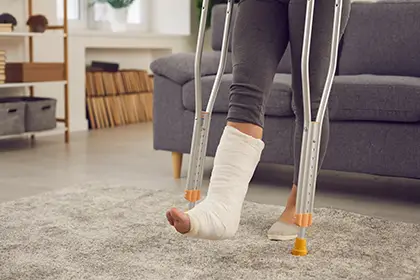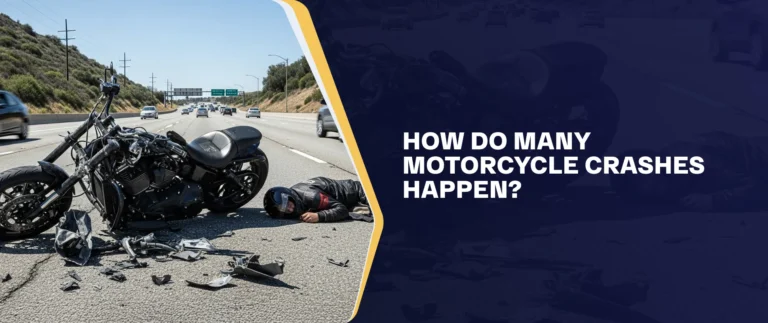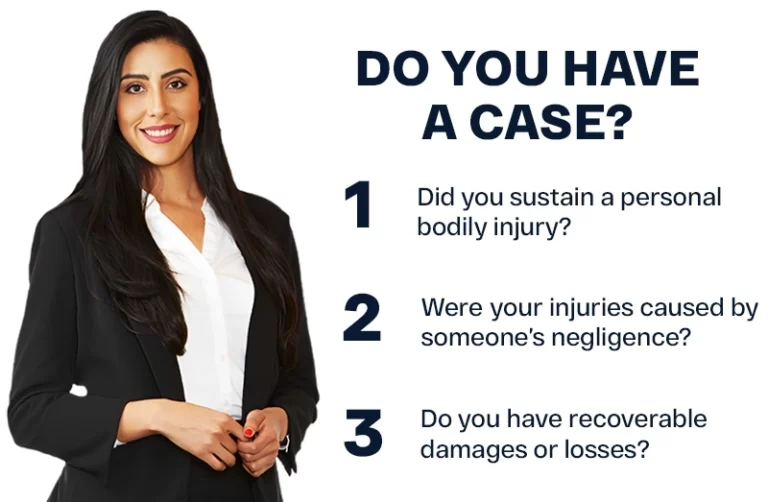Table of Contents
Riding a motorcycle provides a unique sense of freedom and thrill, but this can lead to a harrowing, unexpected turn when you get in a motorcycle accident. There is no limit to the amount you can claim if you are injured and seeking compensation. However, the amount available varies depending on the specifics of your case. The motorcycle accident lawyers at Arash Law, led by Arash Khorsandi, Esq., can help you estimate the potential value of your claim and seek damages. Call us at (888) 488-1391 for a free initial consultation.
Two sides to owning a motorcycle are the excitement that attracts many people and the fear that can come after a serious crash. A motorcycle accident can impact one’s life, not just their bones and bikes. Amidst this tragedy, we aim to illuminate the path toward compensation for those whose lives have been abruptly altered by such unfortunate events.
If you were injured in an accident due to someone else’s negligence, you may be able to seek compensation for the resulting injuries and damage. Moreover, attempting to manage the situation alone can result in undue stress and unfair settlement offers.
Seeking legal counsel from a personal injury law firm can help you navigate the legal process. We can handle negotiations with insurance companies on your behalf. We will assess the severity of your injury and property damage and explain how our experienced motorcycle accident lawyers can help you with your case.
Common Causes Of Motorcycle Accidents
Did you know that a striking 64% of multiple-vehicle motorcycle crashes in a 2018 National Transportation Safety Board (NTSB) study were attributed to errors made by drivers of other vehicles rather than the motorcycle riders themselves?
Motorcycle accidents often occur due to motorcycles veering off the road, side collisions, or rear-ending other vehicles. It is common to see motorcycles fall on the roadway, cars make U-turns or three-point turns in front of motorcycles, bikers overtake other motorists while making a right turn, and motorcycles get rear-ended by other cars.
NTSB emphasizes that these accidents could often be prevented if drivers of cars and trucks were more adept at detecting motorcycles during crucial actions like crossing a road, turning, or changing lanes. However, existing crash avoidance technology frequently struggles to detect motorcycles during left turns or lane changes. Consequently, a significant portion of the responsibility for motorcycle safety falls on the riders themselves.
What Kind Of Damages Can Be Sought In A Motorcycle Accident Case?
In a motorcycle accident case, various damages may be pursued to compensate for your losses and injuries. These damages typically fall into two main categories: economic (special) and non-economic (general).
Economic (Special) Damages
Economic damages refer to tangible and measurable financial losses resulting directly from the accident. These losses are often quantified in specific dollars, providing a clear picture of the collision’s financial impact.
A key purpose of economic damages is to reimburse the injured party for the actual losses incurred or expected due to the accident. Whether it’s medical expenses, lost wages, property damage, or other financial repercussions, economic damages are intended to mitigate these costs and help victims move forward.
A better understanding of economic damages after a motorcycle accident can help you with your claim. The following are common types associated with motorcycle accidents.
Medical Expenses
A motorcycle accident brings physical and financial challenges, especially regarding medical expenses. In the aftermath of the incident, you may find yourself dealing with a range of healthcare needs, including:
- Immediate transport to the emergency room via ambulance.
- Emergency treatment for your injuries.
- Necessary surgeries.
- Hospital stays for recovery and observation.
- Ongoing physical therapy and various forms of rehabilitation.
Medical costs are a significant source of financial strain, not just in California but across the United States. Beyond the immediate expenses tied to urgent medical care, motorcycle accident victims often endure a lengthy rehabilitation process, enduring the physical, mental, and emotional tolls, which lead to continued medical attention and additional financial demands.
In preparing a motorcycle accident claim, it’s crucial to account for the existing medical expenses and anticipate the expected costs of your healing process. Motorcycle accident lawyers meticulously document all your incurred and anticipated medical expenditures to advocate for compensation that reflects these losses.
Lost Wages And Future Earnings
In addition to lost wages, the crash can affect future earnings. This represents the income you may not earn in the future due to the long-term effects of the injury. The compensation sought would include assessing your potential future income loss if the accident, for instance, results in a disability that prevents you from performing your previous job.
Attorneys who handle motorcycle accident cases examine your paycheck stubs and tax returns, which helps us estimate the possible value of your claim. In addition, they can collaborate with physicians and professionals in your field to provide expert testimony illustrating how your injuries have affected and will continue to impact your ability to perform your job. This comprehensive approach helps them keep your claim for lost wages thorough and well-supported.
Property Damage
Damage to property includes the costs of repairing or replacing the motorcycle and any personal property potentially damaged in the crash, such as protective gear. Evaluating the damage to the motorcycle after a collision is crucial in determining the amount of compensation a victim can seek. However, while an essential component of a claim, property damage often constitutes a smaller portion of the total damages sought, such as medical expenses, lost wages, and pain and suffering.
Keeping records of all repairs, replacement costs, and other expenses associated with the damage to motorcycles and related personal property is essential for a claim.
Out-Of-Pocket Expenses
The financial impact of a motorcycle crash extends beyond medical expenses and wage loss. Numerous out-of-pocket costs accumulate, warranting careful consideration when seeking compensation. The following supplementary expenses continue to accrue after the accident, providing a comprehensive insight into your financial challenges.
- Prescription Medications — The cost of prescribed medications, which can mount up considerably, should be factored into your compensation claim. All expenses should be meticulously recorded, from painkillers to specialized medications aiding recovery.
- Mobility Aids and Equipment — Injuries often necessitate mobility aids like wheelchairs, crutches, or canes. The costs for these aids and any other specialized equipment required for rehabilitation or daily activities should be included.
- Home and Vehicle Modifications — Some injuries may require modifications to your home or vehicle to accommodate your changed circumstances. These alterations, ranging from ramps to adaptive driving aids, incur expenses that should be sought.
- Travel Expenses — Traveling to and from medical appointments, therapy sessions, and other essential visits can accumulate costs. Keep track of these transportation expenses, including fuel, public transport fares, or even accommodation if needed.
- Assistance and Hired Help — In severe cases, the need for hired help at home, like an in-house nurse or housekeeper, becomes crucial. The costs associated with this assistance should be recorded for the claim.
Your ability to pursue compensation may hinge on your lawyer’s ability to demonstrate the extent of your financial losses. That is why organizing and documenting all these expenses is critical. Be thorough in maintaining records and receipts, as they can be instrumental in seeking reimbursement for your documented expenses and losses due to the motorcycle accident.
Non-Economic (General) Damages
There is more to a motorcycle accident than visible injuries or medical bills. It is also essential to consider other invisible and non-quantifiable injuries, such as your feelings and how the crash affects your life. These intangible injuries can be grounds to claim so-called non-economic damages.
These damages affect your mental well-being and daily life. You might undergo pain and suffering as your life changes due to the collision. The scars or lasting marks on your body are also part of non-economic damages.
You may not be able to spend time with family or participate in activities at the same level as before. As a result, you can also claim non-economic damages if the accident affects your relationships.
Understanding non-economic damages helps us see the bigger picture of what someone goes through after a motorcycle accident. It’s about recognizing how an accident can change a person’s life and ensuring they get the support and help they need to heal. The following are common types of non-economic damages associated with motorcycle accidents:
Pain And Suffering
“Pain and suffering” is a comprehensive term covering the physical and emotional distress of a motorcycle accident. It extends beyond the immediate physical pain and includes the enduring mental and emotional effects on your overall well-being.
The aftermath of a motorcycle accident can leave lasting trauma, affecting your mental state with anxiety, depression, or post-traumatic stress disorder. Additionally, injuries that result in scarring or disfigurement may lead to self-consciousness about your appearance. Pain and suffering damages acknowledge this impact and seek to compensate for these disruptions in your daily life.
Assessing compensation for pain and suffering requires presenting evidence of the injury’s severity and impact on your life. This may involve your personal testimony, documented observations of the accident’s aftermath, input from family and friends, medical records, and even therapy records if you sought post-accident counseling. Expert testimonies can further support your case.
Calculating pain and suffering hinges on various intricate elements, including the severity and lasting impact of injuries, as well as the injury’s direct and indirect economic costs. Employing a standard numerical formula, the ‘multiplier method,’ is a common approach. This entails multiplying the total economic damages by a factor within the range of 1 to 5, determined by the severity of the injury.
Loss Of Companionship
Loss of companionship refers to the adverse impact of an accident on relationships, particularly with one’s spouse, affecting companionship, intimacy, emotional support, and the ability to maintain a fulfilling marital bond.
Motorcycle accident claims may encompass loss of companionship damages for various family members, including spouses, parents, and children. Each family member’s experience of loss is unique. For instance, spouses may face altered household contributions and intimacy. At the same time, children and parents may grapple with a lack of support, guidance, and societal connection. The effects on relationships can be profound in the aftermath of the accident.
While unable to fully restore relationships, financial compensation can help families adjust to a changed dynamic and begin the adaptation process. Establishing eligibility for these damages is typically supported by testimonies provided by the affected individual and their close family members. Injury attorneys thoroughly examine the repercussions of the motorcycle accident on the entire family, often employing a comprehensive approach when advocating for fair compensation.
Wrongful Death
This is perhaps the most emotionally challenging aspect. If a motorcycle accident tragically results in a fatality, the deceased’s family can pursue damages for wrongful death to address the emotional and financial impact. It covers funeral expenses, loss of future income, loss of companionship, and other emotional and financial losses suffered by the family due to the loss.
Punitive Damages
These damages are additional and are awarded if the at-fault party displayed grossly negligent behavior or has a history of similar incidents. However, it’s important to note that such awards are relatively rare and typically require strong evidence and legal representation. They are intended to act as a deterrent and punishment.
Distinguishing Severity Of Injuries In Motorcycle Accidents: Hard Injuries Versus Soft Tissue Injuries
Claims involving motorcycle accidents can be tough to handle. One important thing to understand is the different kinds of injuries that can happen. These injuries typically fall into two categories: hard injuries and soft injuries. They are quite different in their severity and effect on your life.
Hard Injuries
Injury to your body’s external or internal parts is considered a hard injury. Often, they involve broken bones or injuries to the brain or spine. The term “hard” pertains to its seriousness and long-term effects on you. Hard injuries demand significant medical attention, which often leads to extensive rehabilitation and lifestyle adjustments.
- Fractures and Dislocations — Fractures, or broken bones, are a common hard injury in motorcycle accidents. These can range from minor fractures to complex, compound fractures. Dislocations involve the displacement of bones from their regular positions, causing immense pain and requiring significant medical intervention and rehabilitation.
- Traumatic Brain Injuries (TBIs) — This injury results from a strong blow or jolt to the head, causing brain dysfunction. TBIs can range from mild concussions to severe brain damage, potentially altering a person’s cognitive and motor functions permanently.
- Spinal Cord Injuries — Spinal cord injuries can have catastrophic consequences, often resulting in paralysis or loss of motor function. The severity of this injury depends on the location and extent of damage to the spinal cord, significantly impacting an individual’s mobility and quality of life.
- Severe Cuts — Deep cuts or lacerations that cause substantial bleeding and tissue damage fall under hard injuries. These injuries often require surgery and extensive medical treatment and can result in long-term scarring and disfigurement.
Soft Tissue Injuries
Soft tissue injuries are not as visibly apparent as hard injuries and primarily involve damage to the body’s muscles, ligaments, tendons, and other connective tissues. Despite being less severe than hard injuries, soft tissue injuries can still cause considerable pain and discomfort, requiring medical attention and rehabilitation.
- Whiplash — Whiplash is a common soft tissue injury in motorcycle accidents, typically resulting from sudden jerking or forceful head and neck movement. It can cause neck pain, stiffness, headaches, and sometimes even memory problems or difficulty concentrating.
- Sprains and Strains — Soft tissue injuries like sprains (ligament tears) and strains (muscle or tendon tears) can be painful and limiting. They often require physical therapy and time to heal, affecting an individual’s ability to perform daily activities.
- Bruising and Contusions — Bruises and contusions are common soft tissue injuries from blunt force trauma during a motorcycle accident. Although they usually heal independently, severe bruising can be painful and require medical attention.
In any motorcycle accident case, understanding the nature and severity of injuries, whether hard or soft tissue, is essential for appropriate medical treatment and filing a claim. If you are involved in one, seeking immediate medical attention and consulting a legal professional who handles personal injury cases can be vital.
Our team at Arash Law is equipped to guide you through the complexities of your injuries. We diligently gather essential evidence to support your case, helping you seek compensation for your injuries.
The value of a settlement after a motorcycle accident varies based on numerous factors, regardless of the injury type. Our motorcycle injury lawyers offer a free initial consultation, allowing you and your attorney to review the facts of your case. Afterward, we can evaluate the validity of the case and estimate the potential amount you may be able to pursue.
Evaluating Injuries With Long-Term Or Permanent Impact
When determining the value of injuries, the long-term or permanent impact of disabilities cannot be overstated. In essence, injuries that leave a lasting mark significantly increase the worth of a claim compared to those that heal quickly. This is a logical perspective.
Minor injuries that heal quickly and require little treatment allow individuals to return to work or any regular activities sooner. These injuries do not demand extended care and are not debilitating enough to have lasting effects.
Conversely, severe or catastrophic injuries come with hefty costs, encompassing ongoing treatments, surgeries, and rehabilitation. These significantly drive up medical expenses. Long-lasting or permanent disability can also render an individual incapable of working for extended periods, if not for life. There is a substantial loss of earnings and diminished earning capacity, all of which are considered recoverable damages.
Analyzing The Factors Affecting The Settlement Amount In Motorcycle Accident Claims
In a motorcycle accident case, estimating the outcome becomes challenging when the compensation to be awarded is determined by a jury. Certain personal injury damages, like medical expenses and lost wages, are relatively easy to calculate. Others, like pain and suffering, present a more intricate challenge. Understanding these nuances is vital to helping injured riders recover and move forward after the accident. Assessing these damages requires a careful evaluation of various factors:
- Nature and Extent of Injuries — Understanding the type and severity of the injuries sustained by the rider is fundamental in determining the damages they may be entitled to. The more severe the injuries, the higher the losses are.
- Medical Treatment Received and Recovery Period — The amount, duration, and intensity of medical treatments and rehabilitation processes the rider undergoes play a significant role in the assessment. Extensive medical treatments often indicate higher pain and suffering, potentially resulting in increased damages.
- Physical and Emotional Toll — Pain is not only physical. It encompasses emotional distress as well. Mental anguish, trauma, anxiety, depression, and loss of enjoyment of life are all factors considered under pain and suffering. These aspects significantly amplify the calculation.
- Long-Term Effects and Impact on Life — Anticipating the long-term consequences of the accident on the rider’s life is crucial. Factors such as alterations in the quality of life, lifestyle changes, livelihood, and overall well-being contribute to the claim.
Valuing damages accurately involves understanding how the motorcycle accident has personally affected the plaintiff. In the eyes of a jury, a plaintiff with a permanent limp, who had been active and enjoying various activities, will likely receive more damages for “loss of quality of life.” However, a plaintiff who, while permanently disabled, doesn’t experience any impact on their livelihood may have lower damages for lost earning potential than a plaintiff who is significantly affected by the accident.
Understanding Comparative Negligence Rules And Other Factors Affecting Motorcycle Accident Claims
An important decision a motorcycle accident victim faces is whether to seek compensation for their injuries. While filing a motorcycle accident lawsuit is an option, it’s crucial to understand that many cases are resolved outside the courtroom through amicable settlements.
Most accident victims opt for settlements, where they accept compensation from their insurance company. In return, they commit not to pursue additional claims related to the accident. However, determining the potential settlement value involves a complex interplay of several crucial factors aside from the extent of damage and the severity of injuries sustained:
- Insurance Policy Limits of the at-Fault Driver — The at-fault driver’s available insurance coverage directly impacts the potential settlement.
- Clarity Regarding Fault — A precise determination of fault affects the negotiation process and the resulting settlement.
- Quality and Credibility of Evidence — The quality of evidence presented, including medical records, expert testimonies, and other supporting documents, strongly influences the assessment. Clear, convincing evidence that vividly outlines your pain and suffering is vital.
- Comparative Negligence or Fault — If the accident was partly your fault, this could affect the pain and suffering evaluation. It might reduce the available compensation proportionally, depending on the laws of the state where the accident occurred.
- Legal Representation and Skilled Negotiation — A skilled motorcycle accident lawyer can help you negotiate with the at-fault party and their insurer. If you weren’t given a fair settlement offer, your lawyer can consider taking your case to court.
- Case Precedents and Legal Strategies — Previous cases and legal strategies can guide the assessment of pain and suffering. Analyzing outcomes of similar cases helps in understanding how the courts have evaluated and awarded compensation for pain and suffering.
When both parties share partial responsibility, jurisdiction laws can significantly influence compensation. Some states operate under contributory negligence rules, where victims are prohibited from pursuing a claim if they hold a minimal share of the accident’s responsibility. Conversely, other states follow comparative negligence rules, allowing accident victims to seek partial compensation even if they share fault.
Depending on the jurisdiction’s rules, victims can pursue a claim if they bear a certain percentage of responsibility for the accident. In modified comparative negligence states, victims can seek compensation if they are less than 50% or 51% at fault. In pure comparative negligence states like California, victims can pursue a claim even if they were predominantly responsible for the accident. Their damages are proportionally reduced based on their level of liability. For instance, a driver found 10% responsible for the accident may still seek compensation covering 90% of their losses.
Understanding these settlement factors and the laws applicable in your jurisdiction is essential when navigating the complexities of a motorcycle accident lawsuit. It equips you to make informed decisions and pursue compensation for the losses you have suffered. Seeking guidance from lawyers who handle motorcycle accident cases can be helpful in your settlement negotiations.
The Implication Of Fault Allocation On The Worth Of Your Accident Claim
The extent to which you are held responsible for an accident can significantly reduce the worth of your personal injury claim. The reasoning behind this is straightforward. In most personal injury cases, the essence of the claim centers on another party’s negligence — whether it’s a fellow driver, a property proprietor, or a medical practitioner. Often, the opposing party will argue that you, too, hold some responsibility for the injuries you sustained. If this argument of shared fault is successful, it can substantially reduce the value of your claim. Your shared fault might even invalidate your personal injury claim in certain states.
Understanding and dealing with this aspect of fault allocation is crucial in pursuing a personal injury claim. It underscores the importance of thorough investigation, sound legal representation, and strategic negotiation in personal injury cases. It’s imperative to gather strong evidence and build a compelling argument to mitigate any potential reduction in claim value due to allocated blame.
The Availability Of Insurance: A Crucial Determinant Of Accident Claim Outcomes
The worth of your personal injury claim is fundamentally tied to what you can realistically obtain. This highlights the significance of insurance in gauging the value of your case. In most scenarios, pursuing legal action against an uninsured person is usually not a viable financial decision unless the opposing party has substantial financial resources that can be utilized to fulfill the claim (often termed as “deep pockets”).
Having insurance coverage greatly impacts the potential compensation in personal injury cases. It may serve as a source from which compensation can be sought. Conversely, dealing with an uninsured party poses a challenge in seeking reimbursement for losses. Individuals need to be informed about the insurance coverage of the parties involved. Potential claimants should consider seeking legal advice regarding their options and the possible outcomes based on the availability of insurance.
Assessing The Impact Of Medical Care: Conventional Treatments Versus Nontraditional Treatments
When assessing the value of a personal injury claim, the type of medical care the victim receives plays a vital role in the reimbursement process. Traditional treatments, including surgeries, therapies, or medications prescribed by licensed medical professionals, are usually covered by insurance. However, there can be disputes from insurance adjusters regarding reimbursement for nontraditional therapies such as acupuncture, massage therapy, or chiropractic care. They may argue that these therapies inflate medical costs.
The medical care you receive in a personal injury claim holds significant weight. Whether conventional or unconventional, it profoundly impacts the compensation that may be available to you. Understanding these dynamics is crucial to seeking reimbursement. Striking a balance between both types of treatments, supported by expert opinions and legal support, can guide you in pursuing compensation for your medical care.
Deciding When To Seek Legal Representation
Understanding when to involve legal representation can be beneficial for anyone seeking to file an injury claim. Most lawyers provide complimentary initial consultations to evaluate potential claims and their validity. During this assessment, attorneys also weigh the legal terrain they would be navigating. It’s vital to grasp that insurance adjusters may challenge claims, depending on the circumstances. An experienced lawyer’s role is to negotiate on your behalf and advocate for your interests.
Most personal injury attorneys in California work under a contingency fee structure. This means that they only receive payment when they obtain compensation on behalf of their clients.
Navigating The Timeframe For Settling Motorcycle Accident Claims Or Lawsuits
Estimating the specific duration for settling a motorcycle accident claim or lawsuit can be challenging due to various circumstances. Reaching a settlement involves all parties converging and finding common ground. Recovery periods also vary, while gathering substantial evidence is essential to establish a strong case. Typically, fault determination is initiated by both the insurance company and your attorney after considering various elements such as police reports and victims’ medical records.
Once you engage a lawyer, you enter the negotiation phase, where you can present demands to your insurance company and the at-fault driver’s insurer. Being patient and collaborative is essential, as it allows all parties to thoroughly review the evidence and negotiate the terms of the settlement. Many riders and their legal representatives resolve their claims during this phase, eliminating the need for further legal action.
When the case is clear-cut and liability is apparent, it may lead to early resolution of the claims. The insurance company often aims for a rapid settlement to close the case, while your motorcycle accident attorney can review the offer to assess whether it’s reasonable.
Legal proceedings may start if negotiations fail to yield a fair settlement, significantly amplifying your attorney’s role, though trials are infrequent in these scenarios. Lawsuits follow a multi-stage process, commencing with the discovery phase, where both parties gather evidence and question witnesses. Subsequently, mediation attempts, often facilitated by a mediator, may resolve the case outside court.
In the event that mediation is unsuccessful, your case may advance to trial, where an attorney will represent you before a judge or jury. The trial’s duration can significantly vary based on the case’s complexity, ranging from a single day to several months.
Understanding the intricacies of this timeline is vital for individuals navigating the legal landscape of a motorcycle accident lawsuit and managing expectations during the entire process. It emphasizes the importance of legal guidance, strategic negotiation, and preparation for potential legal action.
Additionally, knowing when to hire an attorney can impact your case’s progress. A lawyer provides comprehensive legal assistance and insights into your specific case. They can help you navigate the complexities of a motorcycle accident lawsuit.
Identifying The Responsible Parties And Determining Liability
Following a motorcycle accident, determining liability is pivotal. Each driver on the road has a duty of care towards others, mandating responsible actions for the safety of all. If a driver breaches this duty and causes an accident, they bear liability. This includes motorcycle riders and drivers of other vehicles, motorcycle manufacturers, and even government entities responsible for road maintenance and safety.
Identifying the party is vital for pursuing a motorcycle accident settlement. If you are grappling with a motorcycle accident case, seeking professional legal assistance can be beneficial in navigating this intricate process. Motorcycle accident lawyers can provide legal support and guidance for your case.
Knowing The Defenses At-Fault Parties Employ In Motorcycle Accident Cases
In motorcycle accident cases, establishing liability is fundamental. However, it’s common for the opposing party to employ various defenses to avoid taking responsibility for the resulting losses. These defenses can include disclaiming fault, shifting blame to the motorcycle rider, or asserting a reduction in damages by suggesting the victim worsened the crash through their actions.
Another defense often cited is the statute of limitations, arguing that too much time has passed since the injury occurred. Effectively refuting these defenses requires a comprehensive presentation of the fault and the extent of the losses, thereby underscoring the strength of your motorcycle accident case.
Influence Of Insurance Companies On Motorcycle Injury Claim Resolutions
The role of insurance companies is paramount in shaping the resolution of motorcycle injury claims. Specifically, the responsible party’s insurance company is a key player in the settlement proceedings. It is essential to recognize that statements provided to insurance companies after the accident can considerably impact the overall case trajectory.
Additionally, the principle of contributory negligence, wherein both parties may hold some degree of fault, also factors into the settlement dynamics. Understanding these dynamics is pivotal in navigating the claims process and pursuing compensation.
Insurance Coverage And Health Expenses
Following a motorcycle accident, health insurance is vital in covering your injuries. However, it’s important to note that you may need to reimburse your insurance company if you were able to get compensation for these injuries. Documenting your medical costs meticulously is crucial. This includes not just your copays or deductibles but the actual expenses incurred.
Accident victims must comprehend potential damages and how various factors impact settlement. Seeking legal guidance can help in making informed decisions throughout this intricate journey.
Arash Law: Guiding Your Path To Compensation After A Motorcycle Accident
Getting through the aftermath of a motorcycle accident may require legal knowledge and advocacy. You have to understand your rights to pursue compensation. Arash Law provides legal guidance and support throughout this complex journey. Our team of skilled trial attorneys handles motorcycle accident cases, equipped with extensive knowledge and a commitment to supporting our clients.
At Arash Law, we understand the nuances of motorcycle accident claims. Whether it’s negotiating with insurance companies, establishing liability, or quantifying damages, we stand by you every step of the way. Our comprehensive approach addresses medical expenses and delves into the intricate details of pain and suffering, loss of income, property damage, and other related costs.
We aim to settle your case and help you seek compensation that reflects the accident’s impact on your life. We advocate for your rights throughout the claims process. With our ‘client-first’ approach, we align our goals with yours, making your voice heard and prioritizing your interests.
If you experienced a motorcycle accident and are facing the challenging legal landscape, contact Arash Law at (888) 488-1391. Let us handle the legal aspects of your case so you can focus on getting better.











